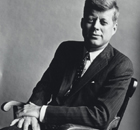Asia-Pacific
India says no talks with Pakistan until it acts
(Agencies)
Updated: 2010-04-14 10:51
 |
Large Medium Small |
WASHINGTON - Indian Prime Minister Manmohan Singh on Tuesday ruled out serious discussions with Pakistan until it took "credible steps" to bring the perpetrators of the 2008 Mumbai attacks to justice.
Singh said he had exchanged pleasantries twice with Pakistan's Prime Minister Yusuf Raza Gilani on the sidelines of a two-day nuclear security meeting in Washington, but they had not covered serious issues during their brief encounters.
| ||||
New Delhi has complained repeatedly about the activities of Lashkar-e-Taiba, the Pakistan-based militant group responsible for the Mumbai attacks which killed 166 people.
"We would like Pakistan to at least bring all of these perpetrators of these horrible crimes to book and do so effectively," said Singh.
"That's the minimum that we expect from Pakistan," he added. "If Pakistan does that, we will be very happy to begin talking once again about all of these issues."
Speaking to reporters on Monday, Gilani refuted India's claims, telling reporters Islamabad had banned Lashkar-e-Taiba and frozen its bank accounts.
Gilani argued that India needed to provide more evidence, to which Singh shot back that senior members of Lashkar-e-Taiba were "roaming around freely" in Pakistan and U.S. intelligence had pointed out its ties to al Qaeda.
"I don't see there is any need for me to provide any additional evidence to Prime Minister Gilani on this."
India and Pakistan have fought three wars since their independence from British rule in 1947, and launched a tentative peace process in early 2004.
India suspended those talks after the Mumbai attacks and senior diplomats held their first official dialogue last month, although no breakthrough emerged.
India has also had tensions with Washington over access to David Headley, the Chicago man who admitted in a U.S. court last month that he scouted targets for the Mumbai attacks.
"I raised that matter to the president (Barack Obama) and he did mention to me that he is aware of the legal position and that we will get access to David Headley," said Singh.
Pakistani pressure on the Obama administration to open up talks on a civilian nuclear deal, much like the one India has with the United States, has also irked New Delhi.
Asked to comment on Pakistan's wish for a nuclear deal, Singh would not be drawn on the issue.
"Who am I to interfere with what goes on between Pakistan and the United States?" he said.
Washington, for its part, has been dubious about even having talks about a nuclear deal, largely due to concerns over the case of a Pakistani scientist Abdul Qadeer Khan, who transferred nuclear secrets to the Democratic People's Republic of Korea, Iraq and Iran.










